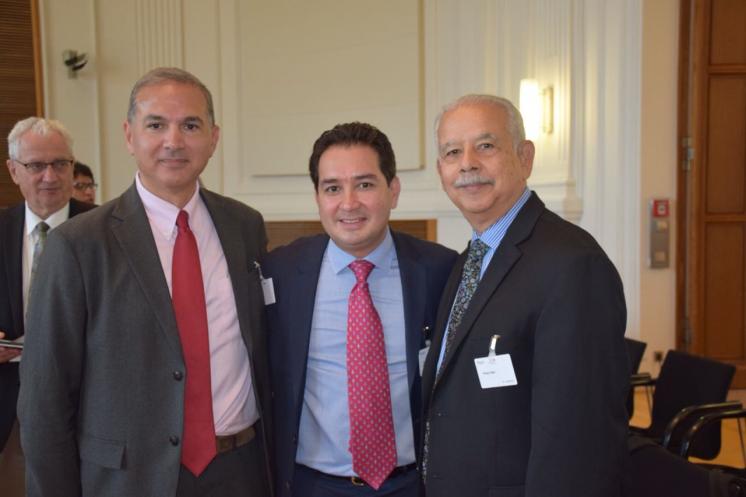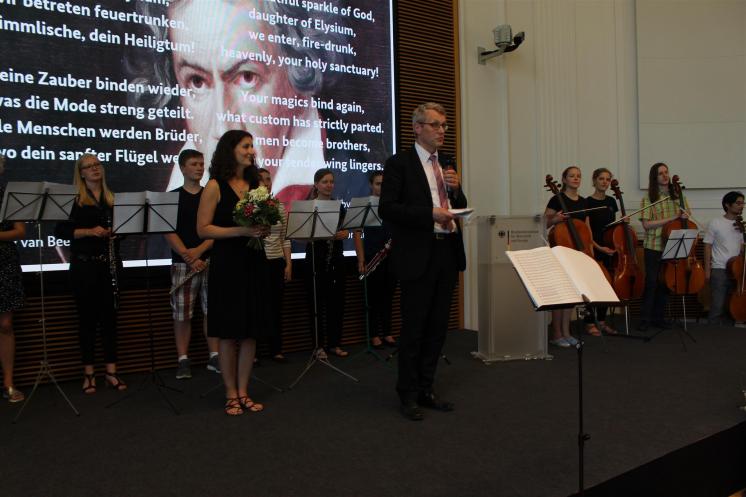
Validations, grievances and a farewell
Validations, grievances and a farewell
EITI Berlin Board Meeting Blog: Day 2
Colombia became the first country in the Americas to meet or exceed all the requirements of the EITI Standard. The Board found Cameroon, the Republic of Congo, Madagascar, Ukraine, and São Tomé and Princípe had made meaningful progress in implementing the EITI. The Board reviewed the expectations for EITI supporting companies and discussed how grievances under the EITI should be addressed. The 40th EITI Board closed with Jonas Moberg’s valedictory remarks to the Board before leaving his post as EITI Executive Director. The Board meeting concluded with a surprise rendition of Beethoven’s “Ode to Joy” organised by our German hosts.
Colombia reaches a milestone for EITI implementation in Latin America
The Board found that Colombia had made satisfactory progress in all requirements of the EITI Standard, becoming the first Latin American country to do so. In a post-conflict environment, EITI-Colombia had provided extensive information on the hydrocarbon and mining sector including mining licensing systems, revenue distribution, subnational revenue, and environmental regulations.

Regional Director for Latin America, Francisco Paris, together with Board members Carlos Andrés Cante Puentes, Vice Minister of Mines, Colombia, and Victor Hart, Chair of EITI Trinidad and Tobago.
Meaningful progress in Cameroon, the Republic of Congo, Madagascar, São Tomé and Princípe, and Ukraine
On Cameroon, the Board noted that the EITI has brought valuable information to the public domain, including through publications of its national oil company (Société Nationale des Hydrocarbures).
On the Republic of Congo, the Board congratulated the multi-stakeholder group on progress made in improving transparency and accountability in the extractive industries by providing a trusted source of data to inform public debate. The Board noted challenges related to space for civil society and encouraged all stakeholders to work together to improve the space for dialogue.
On Madagascar, the Board noted the role of the EITI in supporting national priorities, including on shedding light on license allocation and subnational transfers in the mining sector.
On Ukraine, the Board highlighted that the EITI had played a role in strengthening the governance of the extractive industries by providing timely and publicly accessible information on the revenues from mining, oil and gas, including from transportation and creating a platform for public debate and informing policy-making”. The Board welcomed the extension of EITI implementation to a larger group of companies and to new sectors including coal, iron, manganese, titanium, clay mining and hydrocarbons transportation.
On São Tomé and Princípe’s second Validation, the Board commended the continued commitment of all EITI stakeholders to improving transparency in petroleum operations and revenue management ahead of any potential production.
The EITI stable at 51 implementing countries
While the Board welcomed the Netherlands as the EITI’s newest implementing country, the Salomon Islands informed the Board that they were withdrawing from the EITI due to an important change in the outlook of the country’s mining sector.
What it means to be an EITI supporting company
The Board clarified what it means to be an EITI supporting company by adopting a set of expectations for supporting companies. These expectations seek to align supporting companies’ practices with EITI principles, particularly with regards to the public disclosure of their taxes and payments, contracts and licences and their beneficial owners.
Managing divergent interests and perspectives
The Board reviewed and discussed existing grievance procedures to assess if they are sufficient. The raison d’être of the EITI is to bring together stakeholders with divergent interests and perspectives on critical policy issues. The EITI Board’s role is to manage these conflicting interests and to seek consensus decisions. The Board reviewed the diverse types of grievances related to the implementation of the EITI, to violations of the code of conduct, and to the internal governance of the EITI. Over the coming months, the Board will continue reviewing existing grievance procedures and develop recommendations to ensure that grievances brought by stakeholders are addressed in a systematic manner, in accordance with good governance principles.
Farewell to Jonas Moberg
Jonas Moberg, the departing EITI Executive Director, closed the Board meeting by reflecting on his 11 years at the helm of the International Secretariat. Jonas noted that trust had been the core tenet of the EITI from the beginning. He encouraged the Board to accelerate and deepen efforts on mainstreaming, beneficial ownership and project-level reporting. He noted that preserving civic space was a prerequisite for reforms and for accountability on how natural resources were managed. He called for the EITI Standard to be clear, predictable and equitably applied around the world. Implementing countries ownership of the EITI has been the key driver for success. He called for the EITI to be more creative and more adaptive when it comes to the governance of EITI processes to ensure that EITI structures were fit for purpose and were able to disclose smarter and more timely information.
The meeting closed with a musical surprise organised by our German hosts, an “Ode to Joy” and to the EITI.

Parliamentary Secretary at the Federal Ministry for Economic Affairs and Energy Oliver Wittke concluded the meeting.
Related content



